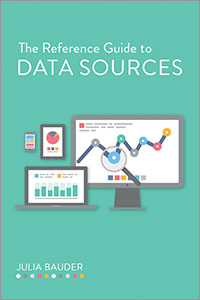
Primary tabs
You don't need to be an ALA Member to purchase from the ALA Store, but you'll be asked to create an online account/profile during the checkout to proceed. This Web Account is for both Members and non-Members.
If you are Tax-Exempt, please verify that your account is currently set up as exempt before placing your order, as our new fulfillment center will need current documentation. Learn how to verify here.
- Description
- Table of Contents
- About the author
- Reviews
This concise sourcebook takes the guesswork out of locating the best sources of data, a process more important than ever as the data landscape grows increasingly cluttered. Much of the most frequently used data can be found free online, and this book shows readers how to look for it with the assistance of user-friendly tools. This thoroughly annotated guide will be a boon to library staff at public libraries, high school libraries, academic libraries, and other research institutions, with concentrated coverage of
- Data sources for frequently researched subjects such as agriculture, the earth sciences, economics, energy, political science, transportation, and many more
- The basics of data reference along with an overview of the most useful sources, focusing on free online sources of reliable statistics like government agencies and NGOs
- Statistical datasets, and how to understand and make use of them
- How to use article databases, WorldCat, and subject experts to find data
- Methods for citing data
- Survey Documentation and Analysis (SDA) software
This guide cuts through the data jargon to help librarians and researchers find exactly what they're looking for.
Acknowledgments 1. Data Reference Basics2. General Sources3. Agriculture and Food4. Crime5. Earth Science--General6. Earth Science--Air, Climate, and Weather7. Earth Science--Water8. Economics--General9. Economics-- Government Finance10. Economics--Firms and Industries11. Economics--Commodities12. Economics--Labor13. Economics--Macroeconomic Accounts14. Economics--Banks and Lending15. Economics--Real Estate16. Economics--Trade and Tariffs17. Education18. Energy19. Health and Health Care20. People and Households21. Political Science--Elections22. Political Science--War and Peace23. Political Science--Other24. Public Opinion Surveys25. Transportation26. Spatial Data27. When All Else Fails: Using Article Databases, WorldCat, and Real Live People to Find Data AppendixesA Citing DataB Getting Started with the Survey Documentation and Analysis Software Index
Julia Bauder
Julia Bauder is the Social Studies and Data Services Librarian at the Grinnell College Libraries. She has written or edited several books, including The Reference Guide to Data Sources, Data Literacy in Academic Libraries: Teaching Critical Thinking with Numbers, and Teaching Research Data Management. She has also published and presented about information literacy, data literacy, and data visualization in venues including Information Technology and Libraries, College & Undergraduate Libraries, and the LITA National Forum.
"A solid starting guide for novices ... may also be valuable for researchers who are unable to access expensive databases or research funds, as the focus is clearly on free or inexpensive resources."
— Reference Reviews
"I highly recommend this work for the intended audience."
— Catholic Library World


